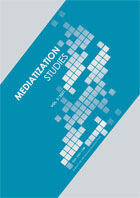Mediatization of Colloquial Language
Mediatization of Colloquial Language
Author(s): Anna GranatSubject(s): Media studies, Sociolinguistics
Published by: Wydawnictwo Naukowe Uniwersytetu Marii Curie-Sklodowskiej
Keywords: colloquial language; mediatization; effects of media reception;
Summary/Abstract: According to linguists, psychologists and media scientists, mass media can have an impact on language, but no clear, hard evidence for this was presented to date. However, based on differentiating the concept of long-term impact from the concept of short-term effect, we used pedagogical experiments and explorations of purely linguistic consequences of the reception of media messages. This led us to obtain a large collection of respondents’ statements. These statements were in turn categorized and subjected to analysis in order to shed new light on the collected material and to document the manifestations of mediatization of colloquial language, by which we understand every act of language use formed as a result of the impact of media. The result of the analysis was isolating the examples for given groups of linguistic behaviours, descriptions of statements and quotations of verbalizations, which can be considered illustrative for the phenomenon of mediatization of the colloquial Polish language, and relatively often also other varieties thereof. These exemplifications also demonstrated that it is possible to structure the list of symptoms of colloquial language mediatization into the following groups and subgroups, which have been further specified in the text of the article: 1. Verbalization of words, phrases, utterances and statements within the semantic field related to the media and media technology; 2. Verbalization/writing of words, utterances, phrases and forms of expression known directly or indirectly from the media; 2.A. Reproductive language behaviours; 2.B. Creative language behaviours; 2.C. Affective language behaviours; 2.D. Media language behaviours; 2.E. Interactive language behaviours; 3. Verbalization and/or recording content using new and/or incorrect grammar and spelling structures, created as a result of media reception (language digitization); 3.A. Digital language economization; 3.B. Digital iconization of writing/speech (see Granat, 2019). The final conclusion resulting from the presented research includes secondary colloquialization of colloquial language as a result of the reception of colloquialized mass media messages.
Journal: Mediatization Studies
- Issue Year: 2021
- Issue No: 5
- Page Range: 37-58
- Page Count: 22
- Language: English

